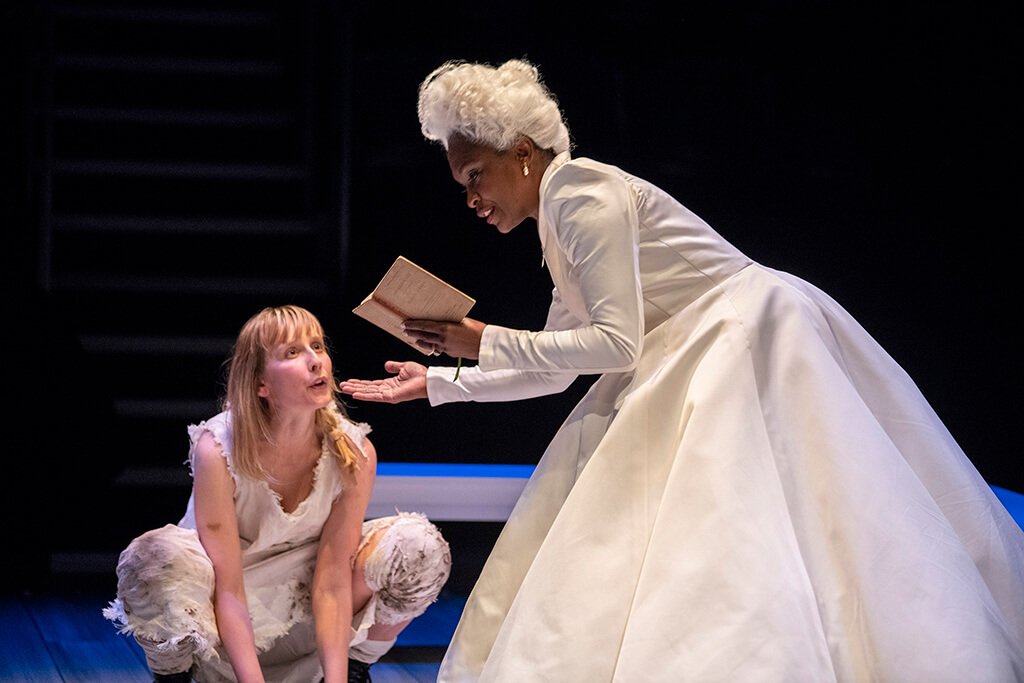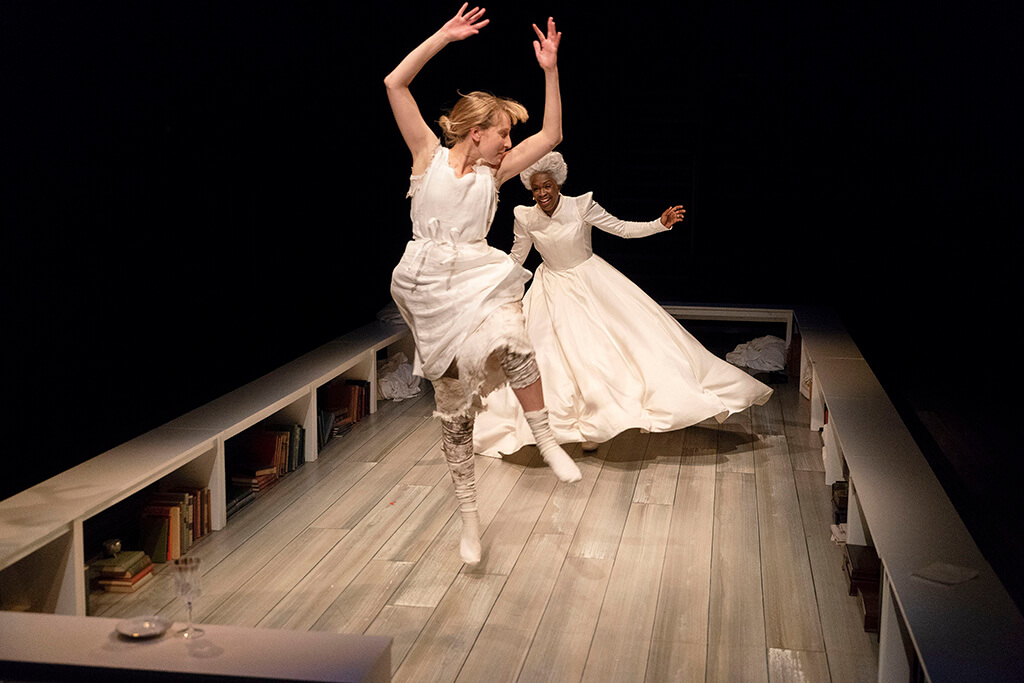
Shaw Festival: The Baroness and the Pig by Michael Mackenzie, directed Selma Dimitrijevic, Studio Theatre, June 10 to Oct. 6. Tickets available at 1-800-511-7429 or www.shawfest.com
Montreal-based Michael Mackenzie is something of a polymath. He is a playwright, screenwriter, stage and film director, and dramaturge, who has worked with both Robert Lepage and Cirque de Soleil, and teaches at the National Theatre School. He has also written scholarly articles on science policy. Not surprisingly, his 1997 play, The Baroness and the Pig, has an intellectual bent. Mackenzie is not so much a playwright of passion, as one of inquiry.
In Mackenzie’s two-hander, set in late-nineteenth-century Paris, a Baroness has taken on a worthy new project. Inspired by Jean-Jacques Rousseau’s seminal book of the Age of Reason, Emile: ou De l’Education (1762), she will transform an enfant sauvage into a viable member of society. Her subject is a bastard child of a large peasant family who was forced to live with the farm animals clad only in a pair of boots. The Baroness (Yanna McIntosh) names the girl Emily (Julia Course) after Rousseau’s Emile. She leaves the grunt work training to her maid Jeannette, whom we never meet, but who is constantly being referenced. The Baroness steps in to perform the fine-tuning. Her goal is to create a perfect downstairs maid whose chief duty will be to answer the door and greet the guests. The Baroness envisions her triumph when Emily is presentable enough to be in the company of the most important people in Paris.
Much of the early laughter from the audience stems from misunderstandings. For example, a very amusing scene is the literal interpretation Emily takes of the doorbell ringing and the tray where visitors are to put their cards. She includes verbatim the Baroness’ instructions as an actual part of the greeting ritual. Emily can’t separate the event from the words. There is a dark side to the story, however. Every time the Baron is mentioned (whom we also never meet), Emily reacts. Her initial start is so subtle that it is easily missed, but as the play continues, her reaction to the Baron’s name is more pronounced. Obviously, nefarious things are happening in this Parisian mansion.
There is another player in the mix and that is director Selma Dimitrijevic. Croatian-born, she relocated to Britain to build her career in theatre, and is now artistic director of Greyscale Theatre Company in Newcastle-on-Tyne. Dimitrijevic clearly understands that in Mackenzie’s subtle play, what is not said is perhaps even more important than what is actually spoken. The Baroness has most of the text, while Emily’s role revolves around facial gestures and halting fragments of speech, but there is a parallel subterranean story happening beneath which the director has carefully worked out with her actors. The Baroness’ bravado covers up a terribly unhappy and lonely woman, and we are not surprised when her submerged depression finally breaks through to the surface. Emily may be new to the civilized world but her animal instincts remain sharp, and we feel that she enjoys frustrating the Baroness with her ineptitude. On the other hand, a growing compassion also emerges in her by the latter stages of the play.

McIntosh is one of Canada’s great actors, and her Baroness is magnificent. Her ramrod posture speaks of years of deportment training that she was subjected to, as does her beautifully gracious hands that are usually clasped together. Nothing is physically out of place for a lady of her station. She is full of flash and fire as her enthusiasm for her Emily project takes root, but McIntosh never lets us forget the complex storm of emotions raging within. The Baroness is also an intellectual who is profoundly moved by art and culture, which Mackenzie cunningly weaves into his script. Her vivid description of a production of Shakespeare’s Julius Caesar is absolutely captivating, as is her melancholy rendering of the famous lament “Connais-tu le pays” from Ambroise Thomas 1866 opera Mignon which is based on a novel by Goethe. Designer Camellia Koo has clothed the Baroness out of period in a severe, if beautifully tailored, mid-nineteenth century, white satin gown with miles of crinoline and an eighteenth century platinum wig. She is a resplendent ship in full sail (although if you sit in the lower reaches, the wide skirt can obstruct the view, especially in theatre in the round.)
Julia Course’s Emily has to negotiate physical awkwardness, beginning with a monkey walk on hands and feet, followed by a slow progression to standing erect, sort of a history of the evolution of humankind. She seems to convey eagerness and wonder at her new life, apparently trying very hard to please, but Course manages to also convey a conspiratorial twinkle in her eye as she clumsily attempts to follow the Baroness’ teachings. There is definitely more to this simple creature than meets the eye. Course has also several scenes where she is collapsed on the floor, howling and mewling, and is absolutely believable in this outpouring of animal-like distress. The two dichotomies of her personality, the animal and the socialized, are both implicit in her performance at all times. Course certainly holds her own against McIntosh’s more flamboyant Baroness. Hers is a quiet strength, and she makes a very good foil for McIntosh. Koo has clothed her in dirty rags, and although the designer adds a clean apron to the costume in the second act. Emily’s wretched beginning is always in plain sight.
Mackenzie raises many questions, most notably the nature versus nurture argument. There is also the idea of class and status — the Baroness, after all, sees Emily rising no further in society than a maid. As well, ethically do we have a right to take people out of their natural milieu? And there is the feminist angle — is the Baroness’ undertaking a result of a clever woman reduced to an idle aristocrat? Why introduce Julius Caesar and Mignon? How do these stories impact on the interweaving between the Baroness and Emily? And why the “Pig” in the title? Mackenzie’s nuanced writing and his fascinating character collision make for a thinking person’s theatre.
- INTERVIEW | Actor Diego Matamoros Takes On Icon Walt Disney In Soulpepper Production Of Hnath Play - April 16, 2024
- SCRUTINY | Opera In Concert Shine A Light On Verdi’s Seldom Heard La Battaglia Di Legnano - April 9, 2024
- SCRUTINY | Lepage & Côté’s Hamlet Dazzles With Dance And Stagecraft Without Saying Anything New - April 5, 2024



